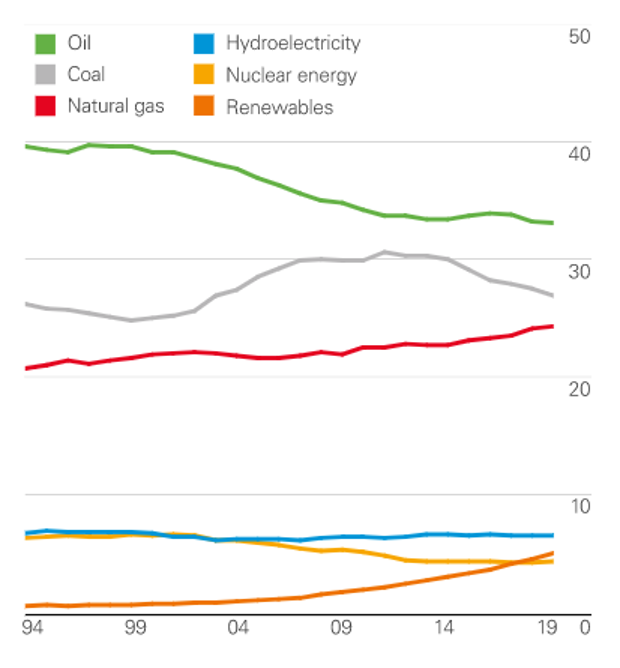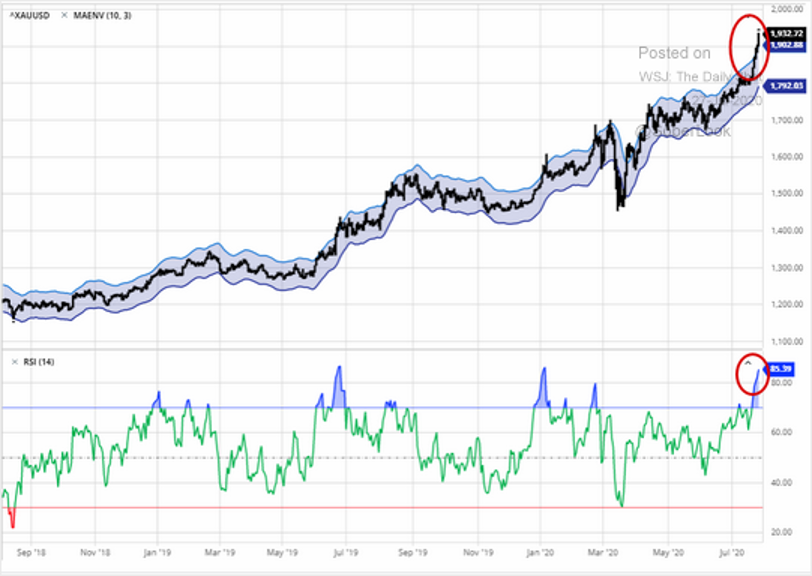1. Internet/Tech Outperformance is Global ….China Tech vs. Market.
YTD-KWEB KraneShares China Internet ETF +34% vs. FXI China Large Cap -3.6%


2. The Tesla for Trucks…Nikola -64% from Highs….$92 High $33 Last.
NIKOLA TRUCKING CHART NKLA

3. It’s Official…Fastest Market Recovery Since 1938.
There is no precedent for such a dichotomy between the markets and the economy. Yet, as stated, this is the fast recovery in the market since 1938. Just not so much for the economy.

As I said, we certainly live in “interesting times.” Navigating The Tech Bubble & Living To Tell About It.by Lance Roberts of Real Investment Advice, 7/27/20
4. The Changing Structure of Energy Markets….
Oil’s percentage share of the global energy mix has steadily fallen in recent decades, from about 40% of energy used in 1994 to 33% in 2019
Reuters

Nevertheless, OPEC has been scaling back expectations. In 2007, it forecast world demand would hit 118 million bpd in 2030. By last year, its 2030 forecast had dropped to 108.3 million bpd. Its November report is expected to show another downward revision, one OPEC source says.

Oil’s percentage share of the global energy mix has steadily fallen in recent decades, from about 40% of energy used in 1994 to 33% in 2019, even as volumes consumed rose with more cars on the roads, rising air travel and a petrochemical industry that makes ever more plastics and other products.
(Graphic – Shares of global primary energy consumption by fuel (%) Source: BP – here

End game for oil? OPEC prepares for an age of dwindling demand-Alex Lawler https://www.reuters.com/
5. The Dollar Hitting Support and Gold Charts
The Daily Shot

Adjusted for inflation, gold isn’t near record highs.

Short-Term Gold Hits Overbought
• Technical indicators suggest that the gold rally is stretched.

The Daily Shot
6. Chipotle Close to Double Off Lows….200 Points Above Previous Highs.
CMG Locations 2600 vs. MCD 38,000

7. CommerciaL Real Estate Update.

Commercial Mortgage Delinquencies Near Record LevelBy Dorothy Neufeld
8. Axios-poll: The rise of coronavirus social bubbles…Half of American Have Formed “Social Bubbles”

Note: 1,076 U.S. adults were surveyed with ±3.1% margin of error; Chart: Naema Ahmed/Axios
Nearly half of Americans say they’ve established social “bubbles” of people they can trust to follow the rules for minimizing the risk of spreading the coronavirus, according to the latest installment of the Axios-Ipsos Coronavirus Index.
Between the lines: The trend isn’t particularly partisan. It is most common in the suburbs and among women, older adults and people with college educations.
Why it matters: This week’s poll findings suggest that Americans are grappling with the reality that the virus isn’t going away anytime soon — and they’re trying to find ways to maintain some social contact without putting themselves at risk.
- This is happening as 46% of Americans say they know someone who has tested positive for the coronavirus. To put that in perspective, only 4% of Americans knew someone who had tested positive when this survey began in mid-March.
- And 18% say they know someone who has died from it — the highest share since Ipsos began asking the question in late April.
By the numbers: 47% of Americans said they’ve established social bubbles, including:
- 51% of women.
- 50% of suburban residents.
- 54% of Americans age 65 and older.
- 51% of Americans with a bachelor’s degree or higher.
9. Trained dogs were able to sniff out Covid-19 infections with 94% accuracy: study

Dogs have smell receptors up to 10,000 times more powerful and accurate than humans. That allows certain trained dogs to sniff out diseases like cancer, malaria and viral infections.
Now, according to German researchers, trained dogs can sniff out coronavirus infections.
A new study, which was piloted by the University of Veterinary Medicine Hannover, the Hannover Medical School and the German Armed Forces found that, if properly trained, dogs were able to discriminate between human saliva samples infected with SARS-CoV-2 and non-infected samples with a 94% success rate overall.
The hope is this method of detection could be one day be used in public areas such as airports, sporting events and other mass gatherings (in addition to laboratory testing) to help prevent future Covid-19 outbreaks, according to researchers.
To conduct the study, researchers trained eight dogs from Germany’s Armed Forces for one week. The trained dogs sniffed the saliva of more than 1,000 people that were either healthy or infected with the virus. Samples infected with Covid-19 were distributed at random and neither the dog handlers nor the researchers on site knew which ones were positive.
In a YouTube video about the project, Maren von Koeckritz-Blickwede, a professor at the university, who conducted the study, says they think dogs are able to do this because the metabolic processes of an infected person “completely change.”
“We think that the dogs are able to detect a specific smell of the metabolic changes that occur in those patients,” she says.
While more research is still needed, Von Koeckritz-Blickwede says the next step is to train dogs to differentiate Covid-19 samples from other diseases like influenza.
According to the Centers for Disease Control and Prevention, while dogs can get infected with Covid-19, there is no evidence that animals play a significant role in spreading the virus.
The study was published in BMC Infectious Diseases on July 23
10. What Are The 4 Virtues of Stoicism? The Daily Stoic Ryan Holiday.
Courage.
Temperance.
Justice.
Wisdom.
They are the most essential values in Stoic philosophy. “If, at some point in your life,” Marcus Aurelius wrote, “you should come across anything better than justice, truth, self-control, courage—it must be an extraordinary thing indeed.” That was almost twenty centuries ago. We have discovered a lot of things since then—automobiles, the Internet, cures for diseases that were previously a death sentence—but have we found anything better?
…than being brave
…than moderation and sobriety
…than doing what’s right
…than truth and understanding?
No, we have not. It’s unlikely we ever will. Everything we face in life is an opportunity to respond with these four traits:
Courage
If you’ve read Cormac McCarthy’s dark and beautiful novel All the Pretty Horses, you’ll remember the key question that Emilio Perez asks John Grady, one that cuts to the core of life and what we all must do to live a life worth living.
“The world wants to know if you have cojones. If you are brave?”
The Stoics might have phrased this a bit differently. Seneca would say that he actually pitied people who have never experienced misfortune. “You have passed through life without an opponent,” he said, “No one can ever know what you are capable of, not even you.”
The world wants to know what category to put you in, which is why it will occasionally send difficult situations your way. Think of these not as inconveniences or even tragedies but as opportunities, as questions to answers. Do I have cojones? Am I brave? Am I going to face this problem or run away from it? Will I stand up or be rolled over?
Let your actions etch a response into the record—and let them remind you of why courage is the most important thing.
Temperance
Of course, life is not so simple as to say that courage is all the counts. While everyone would admit that courage is essential, we are also all well aware of people whose bravery turns to recklessness and becomes a fault when they begin to endanger themselves and others.
This is where Aristotle comes in. Aristotle actually used courage as the main example in his famous metaphor of a “Golden Mean.” On one end of the spectrum, he said, there was cowardice—that’s a deficiency of courage. On the other, there was recklessness—too much courage. What was called for, what we required then, was a golden mean. The right amount.
That’s what Temperance or moderation is about: Doing nothing in excess. Doing the right thing in the right amount in the right way. Because “We are what we repeatedly do,” Aristotle also said, “therefore excellence is not an act, but a habit.”
In other words: Virtue and excellence is a way of living. It’s foundational. It’s like an operating system and the code this system operates on is habit.
As Epictetus would later say, “capability is confirmed and grows in its corresponding actions, walking by walking, and running by running… therefore, if you want to do something, make a habit of it.” So if we want to be happy, if we want to be successful, if we want to be great, we have to develop the capability, we have to develop the day-to-day habits that allow this to ensue.
This is great news. Because it means that impressive results or enormous changes are possible without herculean effort or magic formulas. Small adjustments, good systems, the right processes—that’s what it takes.
P.S. Daily Stoic sifted through the greatest Stoic wisdom and aimed it at one of the most challenging parts of life: habit formation and growth. Check out Daily Stoic Habits for Success, Habits for Success Challenge! Challenge yourself to change what you “repeatedly do.” We are promising that if you can do that, you can achieve excellence—personally and professionally.
Justice
Being brave. Finding the right balance. These are core Stoic virtues, but in their seriousness, they pale in comparison to what the Stoics worshipped most highly: Doing the right thing.
There is no Stoic virtue more important than justice, because it influences all the others. Marcus Aurelius himself said that justice is “the source of all the other virtues.” Stoics throughout history have pushed and advocated for justice, oftentimes at great personal risk and with great courage, in order to do great things and defend the people and ideas that they loved.
- Cato gave his life trying to restore the Roman Republic.
- And Thrasea and Agrippinus gave theirs resisting the tyranny of Nero.
- George Washington and Thomas Jefferson formed a new nation—one which would seek, however imperfectly, to fight for democracy and justice—largely inspired by the philosophy of Cato and those other Stoics.
- Thomas Wentworth Higginson, a translator of Epictetus, led a black regiment of troops in the US Civil War.
- Beatrice Webb, who helped to found the London School of Economics and who first conceptualized the idea of collective bargaining, regularly re-read Marcus Aurelius.
Countless other activists and politicians have turned to Stoicism to gird them against the difficulty of fighting for ideals that mattered, to guide them towards what was right in a world of so much wrong. A Stoic must deeply believe that an individual can make a difference. Successful activism and political maneuvering require understanding and strategy, as well as realism… and hope. It requires wisdom, acceptance and also a refusal to accept the statue quo.
It was James Baldwin who most brilliantly captured this tension in Notes of a Native Son:
It began to seem that one would have to hold in mind forever two ideas which seemed to be in opposition. The first idea was acceptance, the acceptance, totally without rancor, of life as it is, and men as they are: in light of this idea it goes without saying that injustice is commonplace. But this did not mean that one could be complacent, for the second idea was of equal power: that one must never, in one’s own life, accept these injustices as commonplace but one must fight them with all one’s strength.
A Stoic sees the world clearly…but also sees clearly what the world can be. And then they are brave, and strategic enough to help bring it into reality.
Wisdom
Courage. Temperance. Justice. These are the critical virtues of life. But what situations call for courage? What is the right amount? What is the right thing? This is where the final and essential virtue comes in: Wisdom. The knowing. The learning. The experience required to navigate the world.
Wisdom has always been prized by the Stoics. Zeno said that we were given two ears and one mouth for a reason: to listen more than we talk. And since we have two eyes, we are obligated to read and observe more than we talk as well.
It is key today, as it was in the ancient world, to be able to distinguish between the vast aggregations of information that lay out there at your disposal—and the actual wisdom that you need to live a good life. It’s key that we study, that we keep our minds open always. You cannot learn that which you think you already know, Epictetus said. It’s true.
Which is why we need to not only be humble students but also seek out great teachers. It’s why we should always be reading. It’s why we cannot stop training. It’s why we have to be diligent in filtering out the signal from the noise.
The goal is not just to acquire information, but the right kind of information. It’s the lessons found in Meditations, in everything from the actual Epictetus to James Stockdale entering the world of Epictetus. It’s the key facts, standing out from the background noise, that you need to absorb.
Thousands of years of blazing insight are available to the world. It is likely that you have the power to learn anything you want at your fingertips. So today, honor the Stoic virtue of wisdom by slowing down, being deliberate, and finding the wisdom you need.
Two eyes, two ears, one mouth. Remain a student. Act accordingly—and wisely.
P.S. If you’re looking to be a better reader—to build a real reading practice—the Stoics can help. We built out some of their best insights into our Daily Stoic: Read-to-Lead Reading Challenge. It’s going to walk you through more than a dozen actionable challenges that will help you elevate your game as a reader, learn how to think more critically and discover important books that will change your life. We’ve got videos and worksheets and all sorts of recommendations and strategies for you. If you’ve liked any of our other courses, you’ll love this one—it’s awesome, it’s actionable and it will help you get a better ROI out of one of the most important ways we spend our time and enrich our minds. Give it a shot.
Disclosure
Lansing Street Advisors is a registered investment adviser with the State of Pennsylvania..
To the extent that content includes references to securities, those references do not constitute an offer or solicitation to buy, sell or hold such security as information is provided for educational purposes only. Articles should not be considered investment advice and the information contain within should not be relied upon in assessing whether or not to invest in any securities or asset classes mentioned. Articles have been prepared without regard to the individual financial circumstances and objectives of persons who receive it. Securities discussed may not be suitable for all investors. Please keep in mind that a company’s past financial performance, including the performance of its share price, does not guarantee future results.
Material compiled by Lansing Street Advisors is based on publicly available data at the time of compilation. Lansing Street Advisors makes no warranties or representation of any kind relating to the accuracy, completeness or timeliness of the data and shall not have liability for any damages of any kind relating to the use such data.
Material for market review represents an assessment of the market environment at a specific point in time and is not intended to be a forecast of future events, or a guarantee of future results.
Indices that may be included herein are unmanaged indices and one cannot directly invest in an index. Index returns do not reflect the impact of any management fees, transaction costs or expenses. The index information included herein is for illustrative purposes only.